ITB Hospitality Day talk on mobile trends, guest behaviour and Google Glass
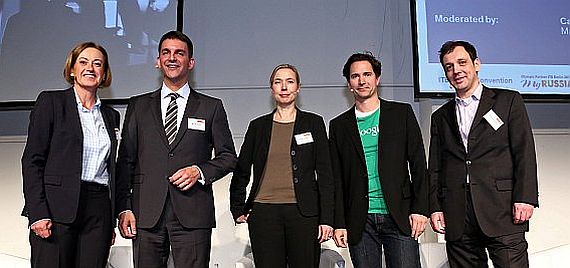 |
| Talking Mobile: (from left) Carolin Brauer, Michael Hucho, Susanne Fittkau, Dr. Bernd Fauser und Andreas Erlemann. |
Berlin (April 12, 2013). The smartphone wave can no longer be held back, but it still hasn't reached everybody. The potential is huge, but just how ready is the travel industry for the mobile trend? Has it already recognised the power of mobile devices and what is feasible? Where are the specifics of the hotel industry? A high-calibre panel of representatives from internet data research, IT, the hotel industry and from Google looked at exactly these questions. The public attending this talk round at the ITB Hospitality Day, the hotel conference at the world's largest tourism fair in March, listened to the interesting and critical assessment of the participants.
Susanne Fittkau, Managing Director of the internet research company Fittkau & Maass Consulting, based in Hamburg, provided data on the mobile market at the beginning of the talk round (see PDF attached) before going on to describe the great gap in competition with respect to mobile trends: Companies such as Lufthansa or Deutsche Bahn are at the very forefront of developments whilst smaller hotels trail significantly behind. Michael Hucho, Vice President Distribution Commercial at Accor Deutschland, draws a distinction in the hotel industry in general and in terms of the mobile trend in particular between chain and private hotels though; the latter still accounts for 70-80% of the market.
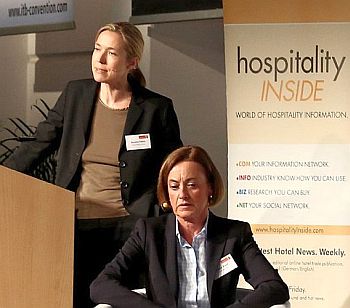 |
|
| Susanne Fittkau (standing) explains research data. |
In hotels, mobile is regarded as a technology issue, Hucho went on. Dr Bernd Fauser, Global Accounts Director Travel at Google, contradicted this view: "Mobile is more an opportunity than an investment!" For him, mobile is the motor for completely new business models and strategies within companies.
Customer and guest demands and the limited functions of smartphones therefore come into play. How does the guest wish to check-in, which functions makes sense, Hucho asked. Setting lights and room temperature in advance, booking a massage on the mobile phone? These are much broader requirements than simply booking a seat with an airline.
Indeed, the task is to identify these guest wishes, software developer Andreas Erlemann stated, Managing Director of Zenith Hospitality Solution. This makes the sector quite specific and decisions are tricky. Yet also in view of mobile devices he said: "Many devices are required, at all times of the day." In order to increase mobile activities, various devices must be compatible with one technology. According to Google surveys, 80 percent of tablet users sit on their sofas today and operate several devices (e.g. smartphone, laptop, TV, radio) at the same time. At the moment, people are still indifferent, Fauser says.
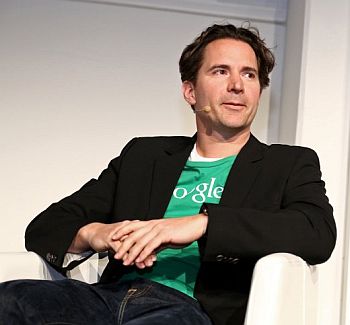 |
|
| Google representative Dr. Bernd Fauser. |
In sight: the digital spectacles
Hotel expert Hucho is unable to say as yet which distribution channel will be the best, which mobile device the most accepted. For the moment, a multi-channel strategy will have to be taken. Susanne Fittkau added that direct bookings are today certainly the most important, though that more and more people are asking to collect information from the same device and to make payments this way.
30 percent of all travel searches are made from a mobile device, Fauser reported; in Great Britain, this is as high as 50 percent. And its this behaviour that the IT giant wants to build upon with its new digital spectacles "Google Glass", which is set to come on to the market this year. A display is integrated into the spectacles that provides digital information on the traveller's surroundings via "augmented reality". It combines various functions and features in the smallest of spaces: As well as telephone and camera (photo, video), it provides an internet connection including GPS (details in separate article on Google Glass/ see link). In relation to the hotel industry this means: Mr Smith from London can immediately identify the concierge on entering his chosen hotel in New York.
Susanne Fittkau added: Does this really bring added value? Does the traveller really want to use such spectacles or should you really ask him beforehand? For Accor at least, these spectacles are a direct marketing opportunity, the company's eCommerce specialist says. "Electronics are growing around our bodies," Michael Hucho summarised, though also said: "Not being online is also important for hotels." He sees only one possibility for hotel operators: Doing market research and then simply experimenting. "If hoteliers do something wrong, the guest simply won't return."
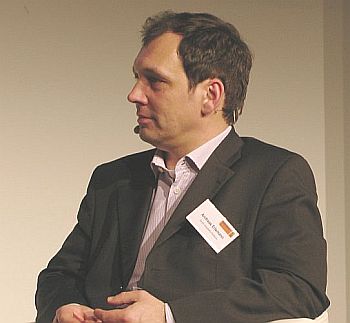 |
|
| Software specialist Andreas Erlemann. |
The talk round viewed data collected automatically about a guest by a hotel with some scepticism and agreed: These data are only of value if they are translated into a customer profile and subsequently into the right services.
The hotel just an online distribution company?
Given the diversity in the hotel industry and embodied in each large hotel chain with its various brands, Hucho demanded global technical standards. Exactly what technology will win the race for the customer remains to be seen.
So much discussion makes Google representative Fauser impatient though: "A hotel is a technology company that incidentally sells rooms," he said provocatively. The IT budget will become the biggest. Carolin Brauer, herself the head of a consultancy for online distribution specialised in hotels interrupted quickly: "We are still talking about hospitality, about food, drink and sleep!"
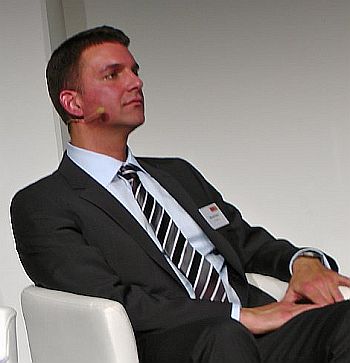 |
|
| Hotelier Michael Hucho. |
The hotel manager concluded with a projection: In five years, every second reservation will be made online. Hotels will no longer use OTAs and other booking engines. Strong brands will provide orientation for the guest here. Software developers encouraged hoteliers indirectly: "Many IT
services will become cheaper and conversions to mobile websites will be easier. Smaller devices, more flexible screens, gesture control - everything is there. Everything is ready for market." And so the next mobile push is only a matter of time. Google representative Fauser was certain: In five years, everyone will be wearing glasses. / map
Watch the YouTube video about this ITB Hospitality Day 2013 session in full length. Click here.
Note also the article "Mobile becomes natural" in our hospitalityInside ITB SPECIAL 2013 (page 26) in which Andreas Erlemann from Zenith Hospitality Solutions and Caroline Brauer from Quality Reservations provide facts, figures and assessments on the mobile market.
| ITB Hospi Day_Panel Mobile_Presentation FittkauM | |

|
|
|
|
|
Continuative Links:
- April 12, 2013 The virtual world on the nose How new Google glasses wants to change travel beginning in Christmas
- April 5, 2013 The global boutique hoteliers - ITB Hospitality Day: How 25hours and Unlisted conquer the metropolises
- March 22, 2013 The aim is work-life integration - ITB Hospitality Day Talk: Gen Y scrutinises hotel industry, employers show way
- March 15, 2013 Constant wooing - ITB Hospitality Day about young travellers: they are hard to win over
To print this article you have to be registered and logged in for newsletter, visitor or subscription.





